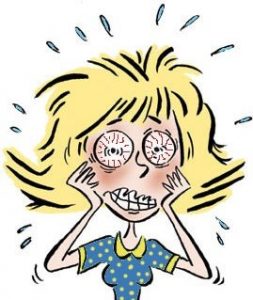One of the more bizarre and annoying fallouts from the COVID-19 pandemic has been the hoarding of toilet paper and other essentials. For weeks, shoppers found the TP shelf of their grocery store completely empty, with only a meager supply of so-called “flushable wipes” available as a substitute.  Many psychological reasons have been given for why people hoard things during a crisis, and the stores and distributors have tried mightily to solve the problem, which is also affected by the supply chain.
Many psychological reasons have been given for why people hoard things during a crisis, and the stores and distributors have tried mightily to solve the problem, which is also affected by the supply chain.
Other results of crises, especially in the US, include the opposing impetuses of great generosity and great selfishness. We have witnessed weeks now of both in our country. For the most part, these reactions are basically individualistic or, at best, based on what we feel is best for the nearest and dearest people in our lives.
Here we will look at the extremely individualistic – or “hyperindividualistic” – example of wipes, especially those designated “flushable,” in the context of and in contrast to the common good. Perhaps this analysis can help us to see other cultural situations in a similar way.
The Product and the Problem
Supposedly flushable and other wipes are made differently from toilet paper.  A December 2019 article by Serkan Durukan and Fatih Karadagli in Science of the Total Environment describes the basics of wipes and their composition:
A December 2019 article by Serkan Durukan and Fatih Karadagli in Science of the Total Environment describes the basics of wipes and their composition:
- Flushable and non-flushable wipes have similar sheet masses, thicknesses, and volumes.
- Wet strength values of flushable wipes are much higher than those of toilet papers.
- Wipes contain synthetic fibers such as polyester and regenerated-cellulose fibers.
- Synthetic fibers are key reasons for why wipes are persistent in sewer systems.
- Synthetic fibers of flushable products should be replaced with plant-based fibers.
There is actually a real group that provides guidelines as to what can and should be flushed down toilets (who knew?!) – the International Water Services Flushability Group (IWSFG). In September 2016, their “flushability specifications” were addressed and signed by over 250 water organizations: “to be flushable a product must (1) break into small pieces quickly; (2) not be buoyant; and (3) not contain plastic or regenerated cellulose but only contain materials which will readily degrade in a range of natural environments.”
This means, for starters, that the major responsibility for making safe and responsible products lies with the manufacturers of those products. These companies, such as Procter and Gamble, Johnson & Johnson, and Kimberly-Clark, are or at least should be knowledgeable about their products, how they are made, and under what guidelines the products should be made.
Unfortunately, what has become very evident over the past several years is that these companies are making and aggressively marketing both flushable and non-flushable wipes of all kinds that are wreaking havoc with septic systems and municipal water treatment plants all over the country. These problems include:
- Wipes grab the impellers inside the pumps, and the pumps burn out. The pumps then need to be replaced – with taxpayer money.
- In Charleston, SC, a report read: “Then we sent divers 80-90 feet deep into the wet well/raw sewage to search in complete darkness with their hands to find and identify the obstruction. As we expected, they came up with these large masses of wipes in their first two loads, with more to come.”
- “Giant fatbergs” have been found in systems all over the world that need to be dealt with, at times expensively.
- Blockages not only cause sewage back-ups in people’s homes but can also cause street flooding.
Some manufacturers (several of whom have faced lawsuits in recent years) argue that their products marked “flushable” pass muster with the guidelines. They maintain that it is primarily non-flushable products that wreak havoc with septic and municipal waste water treatment systems.
And herein lies one of the main reasons for the companies’ stances: wipes are big business!  Sales reached $2.2 billion in North America in 2015. Of course, this means that the leaders at the top benefit greatly from these and other sales. The salaries of the CEOs of these giant companies are in the tens of millions of dollars – far and away higher not only than most of their employees but also of the homeowners who experience serious clogs from the use of these products, of the city workers who must clear the “fatbergs” in municipal water treatment systems, and of the small-business plumbers who must labor in vile conditions to solve what amounts to preventable problems.
Sales reached $2.2 billion in North America in 2015. Of course, this means that the leaders at the top benefit greatly from these and other sales. The salaries of the CEOs of these giant companies are in the tens of millions of dollars – far and away higher not only than most of their employees but also of the homeowners who experience serious clogs from the use of these products, of the city workers who must clear the “fatbergs” in municipal water treatment systems, and of the small-business plumbers who must labor in vile conditions to solve what amounts to preventable problems.
Of course, it is not only the companies that bear responsibility for the problems: we consumers do as well. We are responsible for our purchases and what we do with them. Managers of treatment plants, city officials and others periodically issue notices – pleas, in effect – in local outlets for consumers to only throw the “three P’s” down our toilets – pee, poo and (toilet) paper (Windham County, Vermont; Keene, NH; Mississippi). That is, word is now out that wipes – including those advertised as “flushable” – do not belong in toilets. We consumers have little or no excuse for behaving badly in this regard.
The Hyperindividualistic Perspective
This overview brings us to our analysis – hyperindividualism versus acting on behalf of the common good. It is important to state clearly that individualism is usually a positive value. In the West and in the US in particular, we value the needs of the individual, personal freedom and self-improvement, often embodied in the phrase “life, liberty and the pursuit of happiness” from the Declaration of Independence. It is when taken to the extreme – that is, selfishness, irresponsibility, carelessness and disregard for our neighbors – that individualism needs to be challenged. Both companies (in the form of their top executives) and consumers can behave in a hyperindividualistic manner.
Here are some scenarios in which hyperindividualism manifests itself with regard to wipes and related aspects of this pandemic:
- When giant manufacturers are more concerned about advertising, selling their products and making money than they are about homeowners’ and municipalities’ property.

- When manufacturers and the wealthy CEOs of these companies are willing to defy expert advice, even risking lawsuits, to sell their products and make money.
- When companies have no remorse about the unnecessary expense and effort that cities and individuals must expend to fix the problems their products cause.
- When individuals who buy the products under the enticing sway of manufacturers’ ads ignore expert advice and public entreaties in favor of their individual comfort.
- When hoarders of toilet paper are acting in ignorance and fear, thus greatly inconveniencing their fellow consumers, depriving them of basic necessities and forcing them to buy wipes when they might not normally.
The Common Good Perspective
On the other hand, what would this situation – and others like it – look like in a “common good” scenario, where we were all thinking of and acting for not just ourselves and our own households but our larger society and fellow citizens?
- Manufacturers who still want to make wipes would not advertise them – any of them – as “flushable.” Rather, they would make it abundantly clear to the consumer – in packaging, in television ads, on social media, to stores that purchase the products – that wipes are not flushable. They would, in other words, be “responsible citizens” vis-à-vis their products.
- Companies would take seriously the expert advice given by groups such as the IWSFG. They would not risk lawsuits by creating and marketing products that flagrantly defy this advice.
- Companies might offer at this point in time to fund major cleaning efforts of municipal water treatment systems that are experiencing serious blockages, taking some of the stress off local and regional budgets. Perhaps by getting involved at this basic, very disgusting level CEOs and other top executives would better understand the consequences of their actions and decisions.
- Customers would not purchase and hoard products based on fear. Customers would instead think of their fellow consumers, realize that we are all in this together, and understand that it could be they themselves who become deprived of something they need when the shoe is on the other foot.
- Consumers will become critical thinkers when it comes to advertisements. We will keep ourselves informed of facts and recognize that companies and their wealthy leaders are putting the best “spin” possible on their products – primarily to make a healthy profit, not necessarily to function as responsible citizens.
Conclusion
We make decisions constantly in our everyday lives. We as individuals have choices as to whether our actions based on those decisions will be primarily or even solely for ourselves and our immediate circle or for the common good, for the wider society in which we all live. We as a society – as collective decision-making bodies – also have choices to make.
At the individual level, whether we are the manufacturers or the purchasers of certain products, we make decisions on those products’ use. Today we know for certain that, generally speaking, wipes of any kind should be thrown in the trash, not down the toilet. What will we do with that information? Similarly, what will we do with the other products in our lives? Will we think of the larger ramifications and impacts – will we also push back against crude financial decisions of the very rich – or will we keep doing the same old thing and hope for the best?
Our capitalist (perhaps hypercapitalist) culture generally has very high regard for successful companies and CEOs. We admire the hard work, drive, innovation and intelligence that has led to this success, and we often forgive some of their shortcomings because of the benefits their success, products and services bring to society. Therefore, while we often do not question that CEOs, other top executives and boards feel that their main obligation is to their shareholders, we as a society should also insist that they be responsible to their employees, their customers and the general public. In other words, the success of our for-profits should also benefit the common good – and we all have a responsibility toward that end.
 At the collective level, we and the officials we elect to represent us also have choices and decisions to make. Heaven forbid we get to the point where we must regulate the individual use of wipes! As noted by Brianne Nakamura, an official at the Water Environment Federation, which represents water quality professionals, “There is not a regulating body that actually looks at these products. You can’t say that anything is ‘certified flushable’ or anything like that.” But it is abuses of a vast array of products that have often led in our history to the formation of government regulatory agencies, legislation, warning labels, and stringent categorizations of drugs, cosmetics, food, and so on. While the Trump Administration persists in dismantling many of the regulatory agencies and laws that have existed for decades, it is vitally important for the American people to realize the consequences of this dismantling.
At the collective level, we and the officials we elect to represent us also have choices and decisions to make. Heaven forbid we get to the point where we must regulate the individual use of wipes! As noted by Brianne Nakamura, an official at the Water Environment Federation, which represents water quality professionals, “There is not a regulating body that actually looks at these products. You can’t say that anything is ‘certified flushable’ or anything like that.” But it is abuses of a vast array of products that have often led in our history to the formation of government regulatory agencies, legislation, warning labels, and stringent categorizations of drugs, cosmetics, food, and so on. While the Trump Administration persists in dismantling many of the regulatory agencies and laws that have existed for decades, it is vitally important for the American people to realize the consequences of this dismantling.
Being cognizant of the distinctions between hyperindividualism and the common good in our individual and collective decision-making can help inform our actions – perhaps especially in this time of pandemic and a crucial national election.
